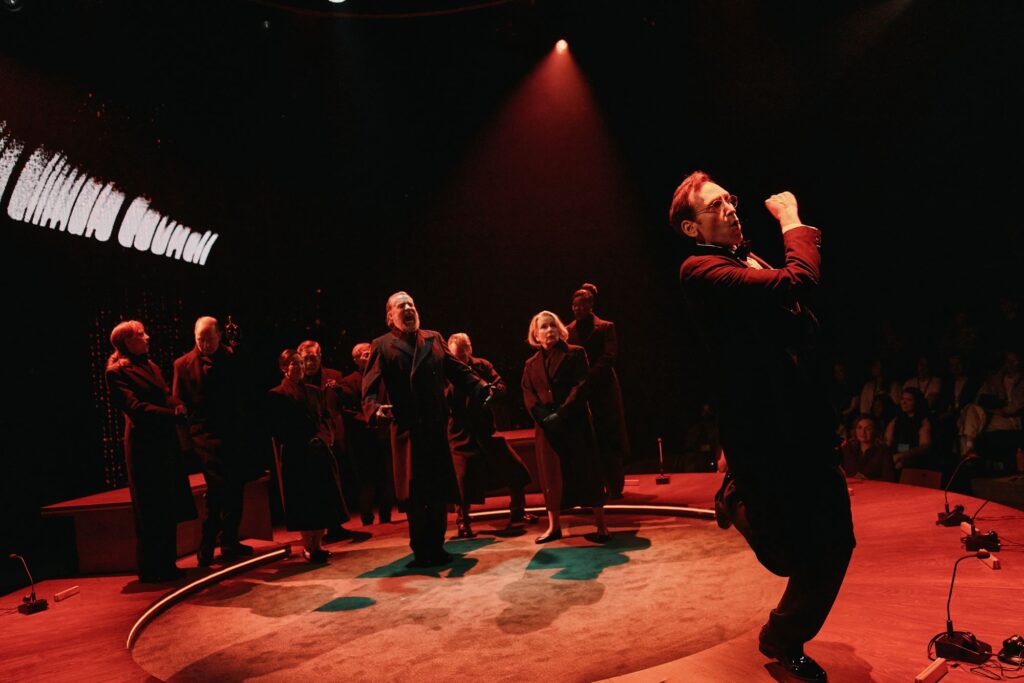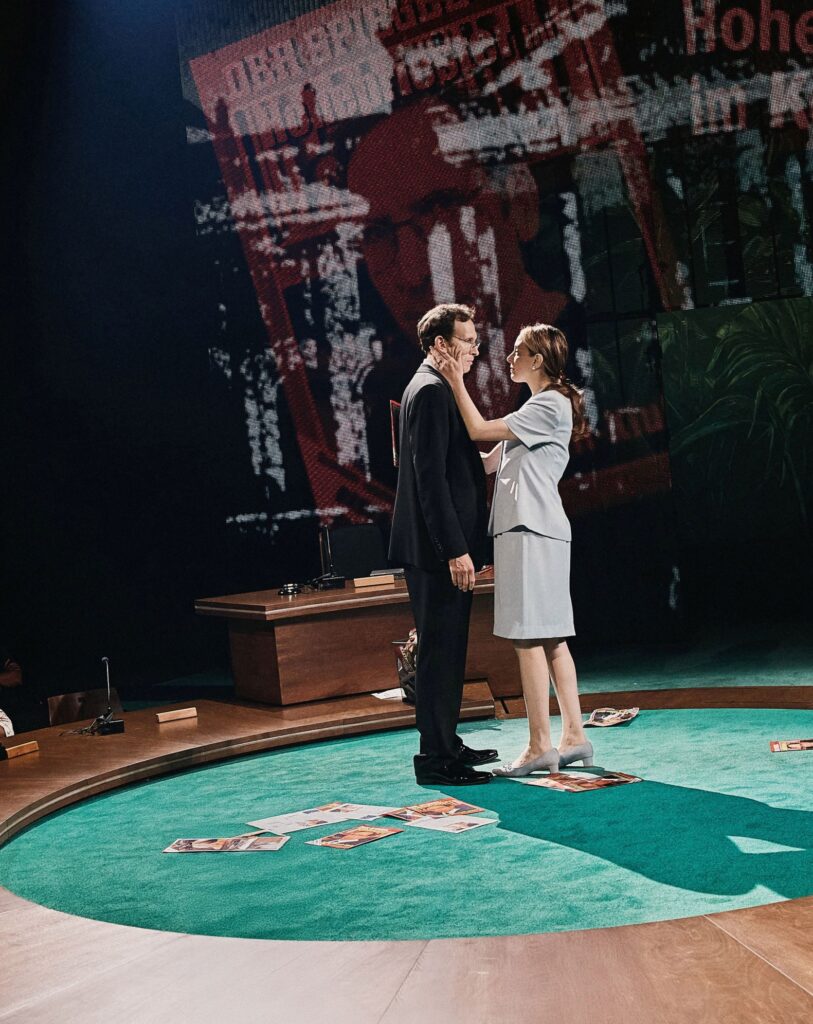Kyoto
Based on events beginning in 1989 leading up to the 1997 United Nations Climate Change Conference in Kyoto, Japan, Joe Murphy and Joe Robrtson’s Kyoto explores what happens when nations agree to confront climate change. The two-act political thriller is in its U.S. premiere at the Lincoln Center Theater at the Mitzi E. Newhouse until November 30, 2025.
Compressing extensive detail, the playwrights reveal how representatives from 160 nations negotiated the Kyoto Protocol. The Protocol committed first-world and emerging nations to limit/reduce greenhouse gases after setting targets and timetables.
A political thriller
Stephen Daldry and Justin Martin co-direct Kyoto, which premiered at the Swan Theatre, Stratford-upon-Avon, then transferred to London’s West End. London audiences appreciated the play’s ironies and humor (directed at the U.S.). The play reveals how the U.S. representative (Kate Burton) and American oil lobbyist Don Pearlman (Stephen Kunken) continually opposed any movement to pin down timetables or targets for emissions. As of 2025 the United States still has not ratified the Kyoto Protocol.
The playwrights uses the slippery Pearlman as their spokesperson to reveal what happened from 1989 through 1997, when nations finally achieved consensus in Kyoto. We learn that the the Seven Sisters (the big oil companies) have appointed him as their agent provocateur to stall and delay any UN agreement on greenhouse gas emissions.

 The cast of Kyoto (Emilio Madrid)
The cast of Kyoto (Emilio Madrid)
A modern-day Iago
Like Iago in Othello, Pearlman talks to the audience about his nefarious plans to obstruct, control and delay. Though the events happen at lightning speed, the play’s Pearlman slow-walks us through his commentary about how to derail progress.
Thwarting the countries that have different agendas than the oil conglomerates, he normalizes delay (with its dire consequences), making us understand why little has been done to effectively curtail global warming. Without particular malice, Pearlman justifies his mission as supporting American’s “freedom” to maintain its first-world economy delivered by fossil fuels. Anything that might harm profits must be stopped. Truly, Pearlman believes in his job in doing it well.
Dismissing climate science
Pearlman, the U.S. representative, and the Saudi Arabian representative (Dariush Kashani) dismiss the seriousness of climate scientists’ predictions. But their delinquency in acknowledging the looming disaster for low-lying nations comes to a screeching halt.
The representative from Kiribati (Taiana Tully) joins forces with 39 other coastal nations to create a powerful negotiating bloc, the Alliance of Small Island States. They make it clear they will not allow the first-world nations to marginalize and destroy them. For it is the first world nations’ emissions that primarily cause global warming.
The play recounts conferences and summits beginning with the 1990 World Climate Conference in Geneva. At each event we see Kunken’s Pearlman enact the strategies he has told us (and his wife Shirley) about. Ever the informed, manipulative oil lobbyist, Pearlman proves his genius at thwarting the 39 coastal nations’ agenda.

 Stephen Kunken, Natalie Gold in Kyoto (Emilio Madrid)
Stephen Kunken, Natalie Gold in Kyoto (Emilio Madrid)
As the emerging nations strain against the stasis and few if any concessions have been made, years pass and sea levels rise. Time is running out. A turning point occurs with the new appointment of Raúl Estrada-Oyuela (Jorge Bosch) as chairman of the proceedings. He bans Pearlman from conferences, and their war proceeds as representatives criss-cross the world in jets that add to the emissions they seek to control.
Urgency
The two men’s performances (they reprise their roles from the London production) convey well the play’s dynamism, pacing and urgency. The momentum of the staging increases the tension. The set by Miriam Buether, a circular conference table, helps create the sense of immediacy and moment. The table also serves as a raised platform where Pearlman addresses the audience as spokesperson. And it becomes various places: a hotel room, Pearlman’s house, a rain forest and more. The fluid, minimal design forces the audience to keep up with the dialogue cues which indicate setting changes.
The lead actors have settled into the skins of their characters. As in real life, Pearlman and Estrada smile and joke while battling each other in a deadly “game” to stop big oil from holding the planet hostage.
Interestingly, the playwrights use the character of Pearlman’s wife Shirley (Natalie Gold) as a foil to soften and humanize the lobbyist. When she finds out that the Seven Sisters knew about the consequences of global warming since 1959 and have kept the research under wraps, she realizes the wickedness of what her husband is doing. If she gives this information to him will it change his approach and viewpoint? Can he live with himself, knowing what the conglomerates have intentionally done for decades to keep profits flowing while endangering the lives of future generations like his son’s?
Some answers
The playwrights answer these questions by the conclusion when Shirley gives a speech that becomes an epitaph for Pearlman and for the U.S.’s potential ratification for the Kyoto Protocol.
At its strongest and most profound, Kyoto dramatizes the tense political and scientific life-and-death battles that eventually result in the world’s first legally binding agreement to limit greenhouse gas emissions. That such sturm und drang resulted in so little is disappointing. However, in light of today’s international global divisions, to have arrived at such a consensus at all seems miraculous and shines a light on possibility.
Kyoto runs until Nov. 30, 2025 at the Mitzi E. Newhouse Theater.


AloJapan.com